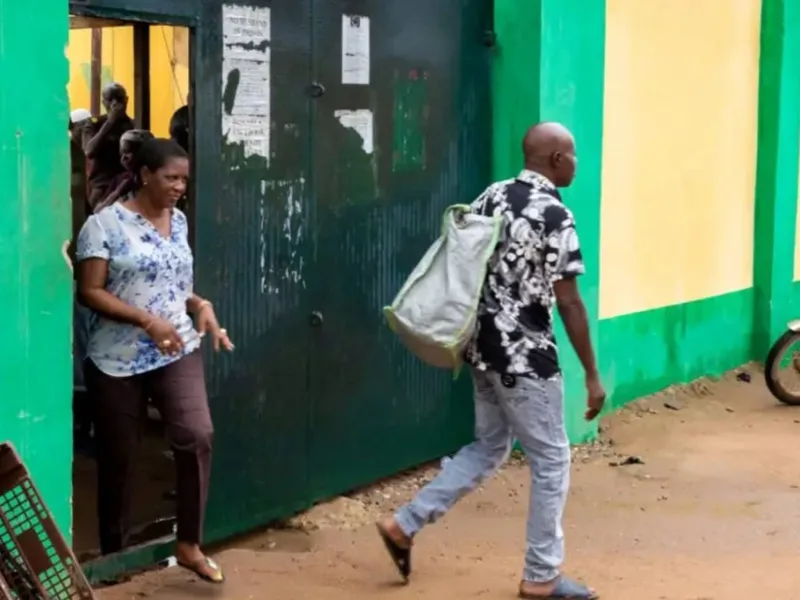In a shocking case of wrongful imprisonment, Lukman Adeyemi, a 52-year-old Nigerian man, was released from prison after spending 24 years behind bars for a crime he didn’t commit. Adeyemi’s ordeal began in 2000 when he was arrested and charged with murder along with his friend, Ismaila Lasisi, after they were accused of killing a woman who had gone to fetch water at their construction site.
How lukman adeyemi ended in prison
I’m Lukman Adeyemi, a 26-year-old bricklayer from Iwerele, Iwajowa Local Government, Oyo State, when my ordeal began. In August 2000, I was arrested and detained alongside my friend Ismaila Lasisi after we were accused of murdering a woman who had gone to fetch water at our construction site. Despite my protests of innocence, I was subjected to brutal torture at the police station, nearly losing my life.
The truth was that Ismaila had previously lived with the woman’s ex-friends, who had hired her to fetch water for them. They had a falling out, and Ismaila moved in with me in March. I had no connection to them and knew nothing about the crime. Yet, I was charged alongside them and sentenced to death in 2009. Our appeals were rejected by the Supreme Court.
Many people doubted my claims of innocence, questioning why I would mention my name if I wasn’t involved. They asked why the court couldn’t see through my innocence and free me. It was as if truth itself had abandoned me. I spent 24 long years behind bars, feeling like I was reliving a never-ending nightmare.
It wasn’t until June 2023, when Deputy Superintendent of Correctional Service AbdulKareem Awesu took an interest in my case and introduced me to a pastor that things began to change.
Despite protests of innocence, Adeyemi and Lasisi were sentenced to death and spent nine years in pre-trial detention before being sent to death row. For 15 years, Adeyemi languished on death row, facing brutal conditions and physical and psychological torture at the hands of SARS police officers who coerced him into confessing to the crime under duress.
The case highlights the flaws and injustices in Nigeria’s criminal justice system, which led to Adeyemi’s prolonged and unjust incarceration. His story is a testament to the systemic problems that plague the country’s legal system, including poor lawyering, police misinformation, and prosecutors’ relentless pursuit of convictions.
A non-governmental organization, Centre for Justice Mercy and Reconciliation (CJMR), located in Ibadan, took up Adeyemi’s case after being approached by a corrections officer who introduced them to the two men. The organization reviewed the court records and evidence, which revealed a trail of inconsistencies and contradictions that pointed to the men’s innocence.
The CJMR’s investigation found that the police had made mistakes and that there was no concrete evidence linking Adeyemi and Lasisi to the crime. The organization presented their findings to the Ogun State Attorney-General’s office and the Committee for the Board of Prerogative of Mercy, which ultimately led to Adeyemi’s release.
Adeyemi’s case is not an isolated incident. The CJMR has been responsible for the release of over 20 individuals wrongfully convicted and secured freedom for more than 600 individuals unlawfully detained in South West Nigeria Custodial Service. The organization has also reintegrated over 300 individuals back into society.
The case highlights the need for systemic reforms in Nigeria’s criminal justice system to prevent similar injustices from occurring. Adeyemi’s story is a stark reminder that innocent lives are at stake when flawed investigations and trials lead to wrongful convictions.









![All 20 Abducted medical students regain Their freedom At least 40 dead in Moscow concert hall attack, Ukraine Denies Involvement Rivers Assembly Overrides Fubara, Enacts New Law Breaking: Former Community Youth Leader, Four Others Shut Dead in Egbema, Imo State [VIDEO] Tragic Incident in Enugu: Mother of Three Commits Suicide After Abandoning Children at Police Station BREAKING: Three-storey building collapses as Ebute Metta, Lagos Akwa Ibom pastor Solid Rock Church, Apostle John Okoriko abia uturu student gunmen Asuu suspends strike bonny lga chairman Hon. David Rogers Irimagha Another Kidnapped Victim, Suleiman Sabo rescued by Police In Abuja](https://reportafrique.com/wp-content/uploads/2020/12/report-afrique-breaking-news-260x195.jpg)
Join our Channel...